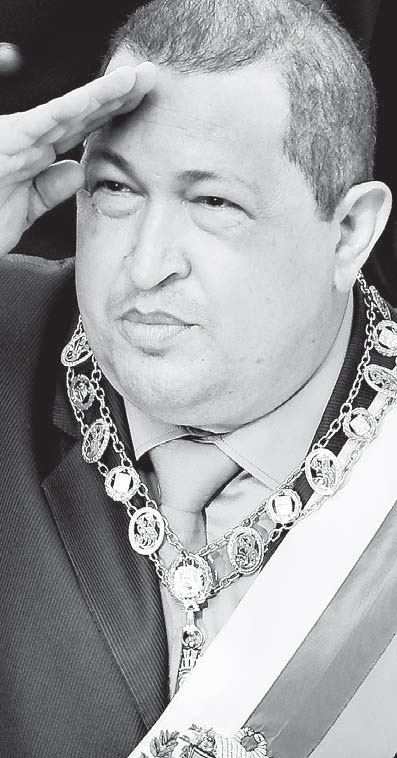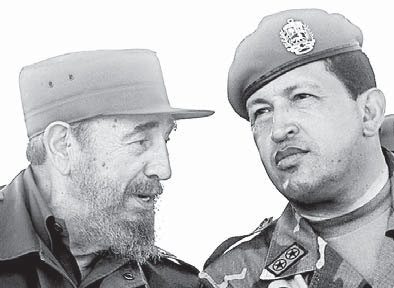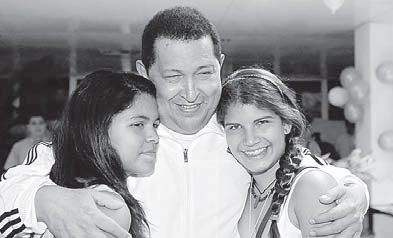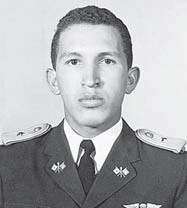'Goodbye forever, Comandante'
|
Chavez salutes military-style before the National Assembly in Caracas on Jan 13, 2012. Leo Ramirez / Agence France-Presse |
|
Venezuelan President Hugo Chavez chats with former Cuban president Fidel Castro on Venezuela's Margarita Island on Dec 11, 2001. Jose Miguel Gomez / Reuters |
|
Chavez hugs members of his family during the birthday celebration for his daughter Maria Gabriela (not shown) in Havana, on March 12, 2012. Presidencia via Agence France-Presse |
|
Chavez is pictured as a cadet at the Military Academy in Caracas. |
Venezuela's leader was gifted communicator, savvy strategist
President Hugo Chavez of Venezuela led one coup attempt, defeated another, and was re-elected three times and became one of the most outspoken rivals of the United States. It almost seemed that the only adversary he couldn't beat was cancer.
He died on Tuesday in Caracas at age 58, two years after he was first diagnosed with the disease.
Chavez was born on July 28, 1954, in the rural town of Sabaneta in Venezuela's western plains, the son of schoolteachers and the second of six brothers. He rose from poverty in a mud-walled house with a dirt floor.
Chavez was a fine baseball player and hoped he might one day pitch in the US major leagues. He entered the military academy at age 17, and continued honing his baseball skills.
During the time, the young soldier immersed himself in the history of 19th-century independence leader Simon Bolivar and other Venezuelan heroes who had overthrown Spanish rule, and his political ideas began to take shape.
That led to him fashioning himself after Bolivar and renaming his country the Bolivarian Republic of Venezuela.
During his more than 14 years in office, the leader electrified crowds with his booming voice and won admiration among the poor with government social programs and a folksy, nationalistic style.
Chavez used his country's oil wealth to launch social programs that included state-run food markets, new public housing, free health clinics and education programs.
Aside from declaring a revolution, Chavez also crusaded against US influence and championed a leftist revival across Latin America.
Master communicator
Chavez was a master communicator and savvy political strategist.
Before his struggle with cancer, the charismatic leader appeared on television every Sunday, speaking for hours and breaking into song or philosophical discourse. He often wore the bright red of his United Socialist Party of Venezuela, or the fatigues and red beret of his army days.
On television, he would lambaste his opponents as "oligarchs", scold his aides, tell jokes, reminisce about his childhood, lecture Venezuelans on socialism and make sudden announcements, such as expelling the US ambassador or ordering tanks to Venezuela's border with Colombia.
Chavez carried his in-your-face style to the world stage as well. In a 2006 speech to the UN General Assembly, he called then-US president George W. Bush the devil.
Chavez even managed to turn his struggle against cancer into a rallying cry, until the illness finally defeated him.
Back in 2010, Chavez took to Twitter with a passion, tweeting regularly and encouraging other leftist Latin American leaders to do likewise. As of February he had 4 million followers on the social website. He even controlled domestic affairs through Twitter when he was under treatment in Cuba.
Supporters eagerly raised Chavez to the pantheon of revolutionary legends ranging from Fidel Castro to Ernesto "Che" Guevara. Even as he stayed out of sight for long stretches during his bout with cancer, his outsized image appeared on buildings and billboard throughout Venezuela. Supporters carried posters and wore masks of his eyes, chanting, "I am Chavez."
Personal life suffers
Running a revolution ultimately left little time for the personal life of Chavez. His second marriage, to journalist Marisabel Rodriguez, deteriorated in the early years of his presidency, and they divorced in 2004.
In addition to their one daughter, Rosines, Chavez had three children from his first marriage, which ended before he ran for office. His daughters Maria and Rosa often appeared at his side at official events and during his trips. He had one son, Hugo Rafael Chavez.
After he was diagnosed with cancer, Chavez acknowledged that he had recklessly neglected his health. He had taken to staying up late and drinking as many as 40 cups of coffee a day. He regularly summoned his Cabinet ministers to the presidential palace late at night.
Chavez exerted himself for one final election campaign in 2012 after saying tests showed he was cancer-free, and defeated his younger challenger, Henrique Capriles.
But months later, he went to Cuba for a fourth cancer-related surgery, blowing a kiss to his country as he boarded the plane.
Chavez said in 2007 he felt a deep connection to those plains where he grew up, and that when died, he hoped to be buried in the savanna.
On Tuesday, Cuban folk singer Silvio Rodriguez posted photos on his blog of a past encounter with Chavez, the Venezuelan leader singing along as he strummed a guitar.
"Goodbye forever, Comandante," Rodriguez wrote.
AP - China Daily
(China Daily 03/07/2013 page11)


















